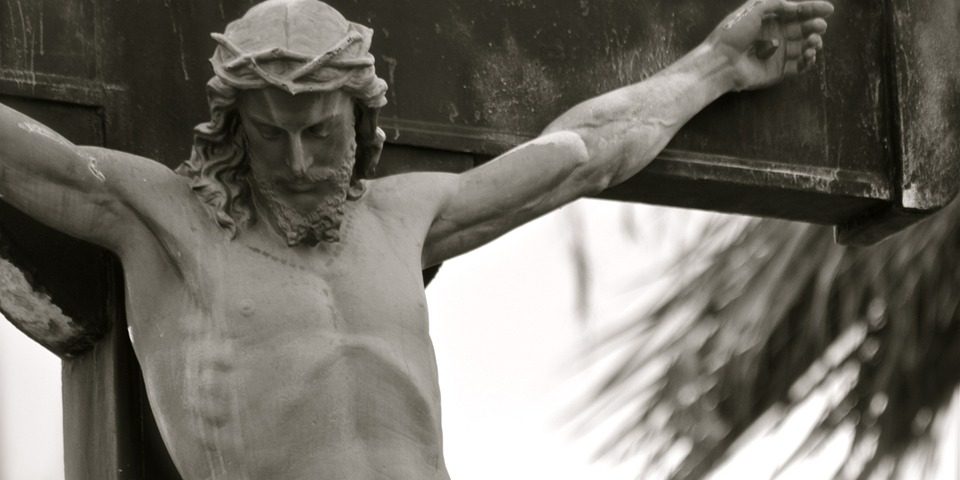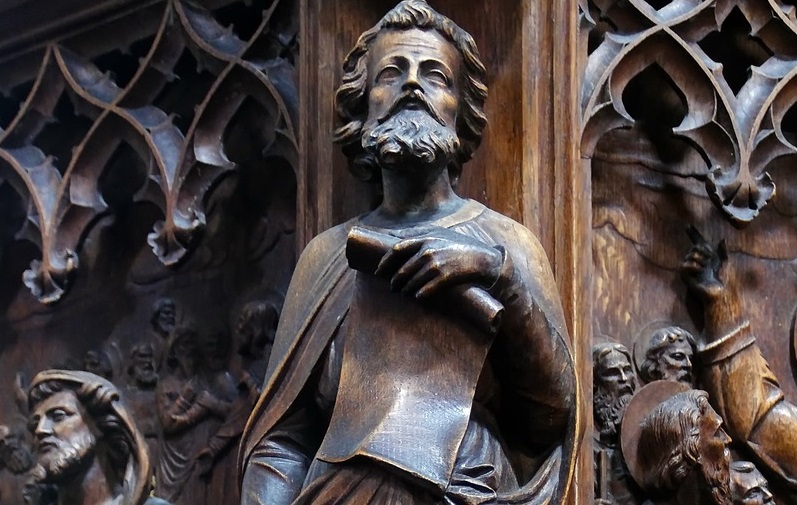In the novel An Accidental Man by Iris Murdoch there’s a scene at the beginning of the death of the matriarch of a well-to-do middle-class family in London. The nearly-deceased was not really loved, or at least there was little positive affection in a family comprised of members so benignly self-centered. They were awkwardly present at best by her bedside; they assumed it was the thing to do. And, of course, no one knew fully what the will said or who would get what.
They debated among themselves whether they should send for a priest. None of them were religious, really; although socially they kept within the outer orbits of the church and clergy. Finally, they settled on not calling a priest; rather, George, the son-in-law, decided he would just read the Bible as the old woman lay dying. “The Lord is my shepherd, I shall not want,” he began to read, the others scattered around the room not knowing quite how to behave. Yet, as he continued to read, Murdoch writes, the words of the Bible began to make themselves present, felt almost like a person is present:
The old words, whatever they meant, were filled with an irresistible authority. The words were at home in this scene. They had been here before. Gently they took charge, silencing all voices but their own, soothing the place into some ancient and formal calm, making of it a temple of mystery…[1]
The words of scripture hushed the moment just for a moment—before the old woman’s death, before the lost and poorly-loved poorly loving her wandered away listlessly. Just for moment did it have an effect, for they all remained lost, those biblical words like some relic they forgot how to hear, much less understand, much less live. Because the word of God by them had long ago been forgot as one forgets other unimportant things, faith but a meaningless memory.
A haunting scene, for me, it is, in my experience, often true to life. Sadly descriptive of the awkwardness of family and faith, pronounced at moments like death, it describes what is the poverty of faith, the poverty of the knowledge of faith, of so many Christians today, or of those who barely for some reason still call themselves Christians. Bereft of any understanding much less commitment, it describes Christians resembling more Nietzsche’s Last Man than Jesus’s disciples, a dead Christianity in deadened souls, having never really been born.
The problem is of a faith that has never really been heard or seen, much less believed. Christianity is supposedly so familiar, so well-known, but few genuinely know it. In most conversations I have with atheists or agnostics, for instance, they describe to me a Christianity I too reject, something completely unreal, which I too find incomprehensible. The same with faltering or frustrated Catholics: so often they describe to me something that isn’t even close to Catholicism, or any form of Christianity for that matter; and despising that, ask me to assuage an anger built often (not always) entirely on misunderstanding, on hearsay and ignorance.
Even our best mistake Christianity. James Baldwin, the great African American writer, was one of the most profound voices of our entire American history. Deeply influenced by Christianity, he was a child preacher; his criticism of Christianity remains, for the most part, searing and true. He left his faith because, as he said, “there was no love in the church. It was a mask for hatred and self-hatred and despair.”[2] Ruined courting power, he was not wrong in his assessment of much of the behavior of Christians. He is still very much correct. Yet, I do wonder what if, in Harlem in the 1930s, he’d gotten a better picture of Jesus, found a faith that was a little less of a show. What, for instance, if his father had given him a better witness, if he hadn’t seen so much hypocrisy so early on?
Of course, I also wonder what Catholics would be like if they had a better understanding of Jesus too. What if, for instance, Catholics knew scripture—I mean, really knew it? What if more Catholics intentionally sought out the wisdom of their own faith? What if more of them were active students of Catholic Christianity? Remember, I said that so often when I talk to Catholics faltering in faith, I find persons who don’t even possess the foggiest basics of the faith they’re about to throw away; what if they did know the faith? What if they studied and understood?
Well, I think we’d all get a better sense of what Jesus meant when he said his disciples should be salt and light, seasoning the world with the truth of Jesus, bringing light to a dark world.[3] Which is our mission, of course, to make disciples by proclaiming the Gospel of Jesus and showing how that Gospel has changed our lives. Which is, honestly, a simple mission; it’s just so rarely carried out. Because too many of us Christians just aren’t up to it—sentimental maybe, culturally conditioned, but unformed.
Part of the problem is that we all want to tackle the great topics and issues of the day, the great moral arguments of our age. But the truth is most of us don’t have the foundation or the wisdom to do that, to do anything other than be passively manipulated (the polite word is “influenced”) by corporations or celebrities or online illusions. I taught the eighth graders myself for confirmation this year; they’re a great group of kids. But, of course, on the first day of class, with thirty-seconds left in the last class of the day, I asked if there were any questions. And, entirely off topic, some kid asked a question about some controversial and controverted moral issue, for which the now twenty-five seconds remaining were insufficient for an answer. Now, I love that they want to talk about the great issues of the day; I’m glad anyone wants to talk about the great issues of the day; but again, with due respect, we lack the foundations and the wisdom even to enter the discussion whether for twenty-five seconds or twenty-five days.
And, of course, grown-ups are no better than eighth graders; in fact, I find the students often brighter. We all seem to start too high up the conceptual ladder, skipping the thoughtful grunt work that goes into worthwhile opinion; most of us just read the CliffsNotes. We assert advertised and unthought conclusions when we’ve not thought very well or very deeply or for ourselves. I could go on and on but suffice it to say it’s no surprise our world, so sophisticated, is still so foolish and noisy, because confidence and crowds do not win arguments; because so many of us are so confident, even though we’re standing on nothing.
But what then should we do? One thing, of course, is to turn off the television and read, and read well. Our problem isn’t so much the left-right divide as too many on either side re-tweet instead of re-read. Now, for Christians, I’m not trying (at least here) to persuade you to think one thing or the other; I’m just trying to suggest how we might become better arguers and not merely asserters of advertised opinions. Ours is an age in which we do indeed need to tackle great moral and political questions, but we need to tackle them better. Which means, for we Christians, that we work on the foundations, the basics, that we learn what Christianity is again. Which means, for one thing, we should listen to Paul and consider taking his advice.
The Christians at Corinth, you see, were a mixed community of the proudly sophisticated, or at least they thought of themselves that way. They were easily impressed by social status, good rhetoric and eloquence. The more impressive the preacher—as they measured impressive—the more carried away they got. Which, in time, got them carried away from Jesus, following more the accolades of human wisdom than the humble, suffering love of the cross; more interested in ideas and respectable religion than life in Christ.
Which is why Paul said (and this is what I think we should take as advice), “I resolved to know nothing while I was with you except Jesus Christ, and him crucified.”[4] Fashionable ideas, eloquence, respectable religion: you can keep it, Paul said. But it’s not what should be first in the mind of the Christian. If the Christian is to be of any value for the Church or for anyone else, he or she must know Jesus Christ and him crucified; the story and then the grace of Jesus must be intellectually and then morally priority one. Otherwise, Paul suggests, you’ll just be hooked like a fish, caught and soon dead; or as Jesus would have said, you’ll end up like tasteless salt and dim light.
And so, here’s the point. We have a lot of issues in the world, in our country, which we must engage—great issues moral and political. And we Christians must be in the argument. But before we enter that argument, before we start arguing with each other—before we start quoting this pope or that or this study or that or that really cool thing you read on Facebook—let’s recommit to learning the basics, that is “Jesus Christ, and him crucified.” Which means, very simply, opening the Bible and reading, becoming a student again of Jesus and living like it’s a truth that matters; like it’s a faith you know; like you’ve met Jesus because you finally have; because you’ve given him the time. Amen.
[1] Iris Murdoch, An Accidental Man, 50
[2] James Baldwin, The Fire Next Time, 39
[3] Matthew 5:13-16
[4] 1 Corinthians 2:2
© 2020 Rev. Joshua J. Whitfield










